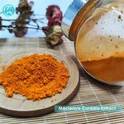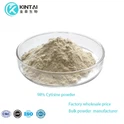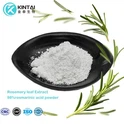Broccoli seed extract has gained significant attention in recent years due to its potential health benefits. Derived from the seeds of the broccoli plant, this extract is rich in various compounds that may offer a range of therapeutic properties. As more research unveils the secrets of this natural substance, understanding its mechanisms of action and potential applications has become increasingly relevant. In this comprehensive blog post, we will delve into the fascinating world of broccoli seed extract, exploring its effects on the human body and its potential uses.
Is Broccoli Seed Extract Good for Weight Loss?
Weight management is a prevalent concern in today's society, and many individuals are constantly seeking effective and natural solutions to support their weight loss goals. Broccoli seed extract has garnered attention for its potential role in promoting weight loss. This section will explore the scientific evidence behind this claim and examine the mechanisms by which broccoli seed extract may contribute to weight management.
One of the primary constituents of broccoli seed extract is glucoraphanin, a compound known for its ability to induce the production of sulforaphane, a potent antioxidant. Sulforaphane has been studied for its potential to regulate adipogenesis, the process by which pre-adipocytes (immature fat cells) differentiate into mature adipocytes (fat cells). By modulating this process, broccoli seed extract may help reduce the accumulation of fat cells and promote a more favorable body composition.
Additionally, research suggests that broccoli seed extract may influence metabolic processes, including glucose and lipid metabolism. By enhancing insulin sensitivity and regulating lipid metabolism, it may contribute to better control of blood sugar levels and improved fat burning capabilities. These effects could potentially support weight loss efforts and overall metabolic health.
However, it is crucial to note that broccoli seed extract should not be viewed as a magic solution for weight loss. While it may offer complementary benefits, a balanced diet and regular physical activity remain the cornerstone of any successful weight management strategy. Incorporating broccoli seed extract into a comprehensive lifestyle approach may yield more favorable outcomes.
Can Broccoli Seed Extract Help Reduce Inflammation?
Inflammation is a natural response of the body's immune system to various stimuli, such as injury or infection. However, chronic inflammation can contribute to the development of various health conditions, including arthritis, cardiovascular diseases, and certain types of cancer. Broccoli seed extract has been explored for its potential anti-inflammatory properties, making it an intriguing subject of research in the field of natural remedies.
The anti-inflammatory effects of broccoli seed extract are largely attributed to its rich content of sulforaphane and other bioactive compounds. Sulforaphane has been shown to inhibit the activity of nuclear factor-kappa B (NF-κB), a transcription factor that plays a crucial role in regulating the expression of genes involved in inflammatory processes.
By modulating the NF-κB pathway, broccoli seed extract may help reduce the production of pro-inflammatory cytokines, such as interleukin-6 (IL-6) and tumor necrosis factor-alpha (TNF-α). These cytokines are key mediators of inflammation and have been implicated in various chronic inflammatory conditions.
Furthermore, broccoli seed extract has been studied for its potential to modulate the activity of enzymes involved in the inflammatory response, such as cyclooxygenase (COX) and lipoxygenase (LOX). By regulating these enzymes, broccoli seed extract may contribute to the reduction of inflammation-related symptoms, including pain, swelling, and redness.
While the anti-inflammatory properties of broccoli seed extract show promise, it is important to note that more research is needed to fully understand its mechanisms of action and potential therapeutic applications. However, incorporating broccoli seed extract into a balanced diet or using it as a complementary approach to managing inflammatory conditions may offer potential benefits.
What Are the Potential Benefits of Broccoli Seed Extract for Heart Health?
Cardiovascular diseases remain a leading cause of mortality worldwide, and maintaining heart health is a crucial aspect of overall well-being. Broccoli seed extract has emerged as a subject of interest due to its potential cardiovascular benefits, which are primarily attributed to its antioxidant and anti-inflammatory properties.
One of the key mechanisms by which broccoli seed extract may contribute to heart health is through its ability to modulate cholesterol levels. Research has shown that broccoli seed extract may help reduce low-density lipoprotein (LDL) cholesterol levels, often referred to as "bad" cholesterol, while potentially increasing high-density lipoprotein (HDL) cholesterol, or "good" cholesterol.
This effect is thought to be mediated by the compound sulforaphane, which has been shown to regulate the expression of genes involved in cholesterol metabolism. By modulating these pathways, broccoli seed extract may help prevent the buildup of plaque in the arteries, a major risk factor for cardiovascular diseases.
Furthermore, the antioxidant properties of broccoli seed extract may play a role in protecting the cardiovascular system from oxidative stress. Oxidative stress is a condition characterized by an imbalance between the production of reactive oxygen species (ROS) and the body's ability to neutralize them, leading to cellular damage and inflammation.
Broccoli seed extract contains compounds like sulforaphane and glucosinolates, which have demonstrated potent antioxidant capabilities. By neutralizing ROS and reducing oxidative stress, broccoli seed extract may help prevent the development and progression of various cardiovascular conditions, including atherosclerosis, hypertension, and heart failure.
While the potential cardiovascular benefits of broccoli seed extract are promising, it is important to note that more research is needed to fully understand its mechanisms of action and potential therapeutic applications. However, incorporating broccoli seed extract into a balanced diet and lifestyle may offer complementary benefits for maintaining a healthy heart.
Conclusion
Broccoli seed extract is a fascinating natural substance that has garnered increasing attention for its potential health benefits. From its potential role in weight management and anti-inflammatory properties to its potential cardiovascular benefits, this extract offers a wealth of opportunities for further exploration and research.
While the findings to date are promising, it is important to approach broccoli seed extract with a balanced perspective and to consult with healthcare professionals before incorporating it into any treatment or wellness regimen.
As with any natural remedy, it is crucial to consider individual circumstances, potential interactions with medications, and the overall context of one's health and lifestyle. Broccoli seed extract should be viewed as a complementary approach, rather than a standalone solution, and should be integrated into a comprehensive wellness plan that includes a balanced diet, regular exercise, and a healthy lifestyle.
By embracing the potential of natural substances like broccoli seed extract and continuing to support scientific research, we can unlock new avenues for promoting human health and well-being in a sustainable and holistic manner.
Our Broccoli Seed Extract Bulk has received unanimous praise from customers. If you would like to know more about this product, please feel free to contact Sales@Kintaibio.Com.
References:
1. Fahey, J. W., Zalcmann, A. T., & Talalay, P. (2001). The chemical diversity and distribution of glucosinolates and isothiocyanates among plants. Phytochemistry, 56(1), 5-51.
2. Fahey, J. W., Zhang, Y., & Talalay, P. (1997). Broccoli sprouts: an exceptionally rich source of inducers of enzymes that protect against chemical carcinogens. Proceedings of the National Academy of Sciences, 94(19), 10367-10372.
3. Mirmiran, P., Bahadoran, Z., Hosseinpanah, F., Keyzad, A., & Azizi, F. (2012). Effects of broccoli sprout with high sulforaphane concentration on inflammatory markers in type 2 diabetic patients: a randomized double-blind placebo-controlled clinical trial. Journal of Functional Foods, 4(4), 837-841.
4. Guo, L., Zhu, W., Zhu, H., & Chen, Y. (2018). Glucoraphanin from broccoli seed products inhibits adipogenesis in 3T3-L1 cells. Journal of Agricultural and Food Chemistry, 66(44), 11594-11601.
5. Tortorella, S. M., Royce, S. G., Licciardi, P. V., & Karagiannis, T. C. (2015). Dietary sulforaphane in cancer chemoprevention: the role of epigenetic regulation and HDAC inhibition. Antioxidants & Redox Signaling, 22(16), 1382-1424.







